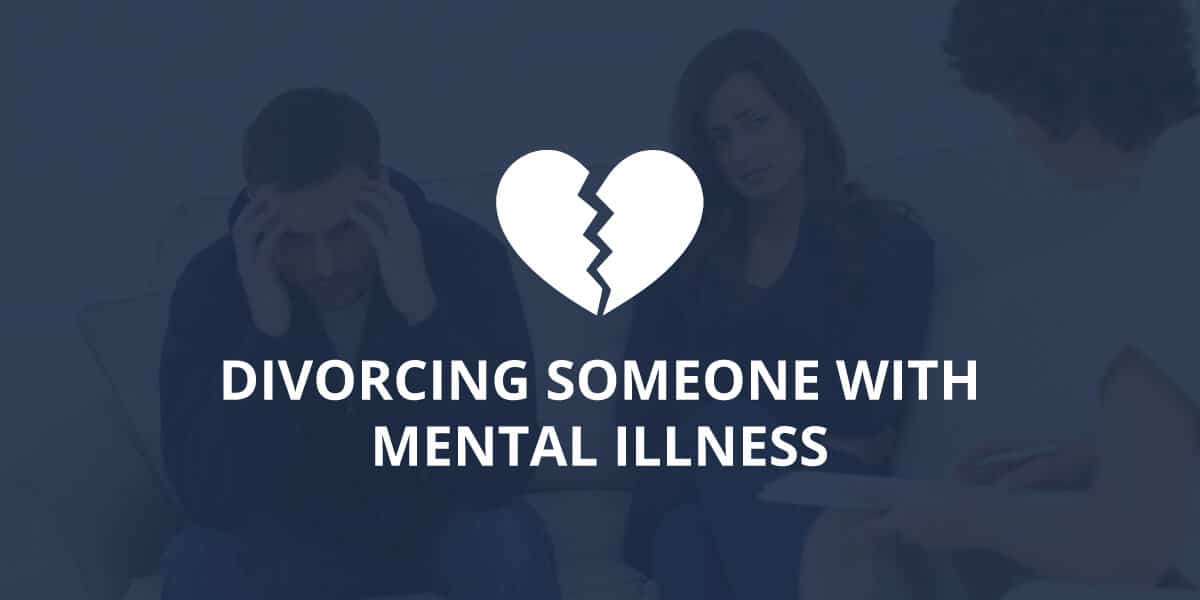Divorcing Someone with a Mental Illness

Going through a divorce is a difficult process, yet it can become even more complicated if your spouse suffers from an undiagnosed or severe mental illness that impacts their reasoning, temperament, or capabilities. If you believe your husband or wife’s condition may affect the divorce proceedings, you should contact Boston divorce lawyer to guide you through the process and protect your rights.
Will a Mental Illness Impact the Divorce?
Your divorce will not necessarily be affected by your spouse having a mental illness. In 2017, approximately 46.6 million adults in the U.S. experienced a mental illness and approximately 11.2 million adults experienced a serious mental illness, according to the National Institute of Mental Health.
This means about one in five adults has been affected by some sort of mental condition, such as depression, anxiety, post-traumatic stress disorder, bipolar disorder, schizophrenia, disordered eating, obsessive-compulsive disorder, phobia, alcoholism, or substance abuse.
There are over 200 forms of mental illness, many of which can be successfully treated with medication and various therapies. Just because your loved one has been diagnosed with a mental illness does not mean this will make your divorce more difficult or affect the outcome.
Are You Concerned for Your Spouse’s Safety?
Many mental illnesses can impact a person’s physical health and safety. Some conditions cause a person to neglect or harm themselves, even to the extent of attempting suicide.
If you are concerned that your husband or wife may try to hurt themselves during the divorce, speak with your Boston divorce attorney right away.
If at any point your spouse tells you they are considering harming themselves or have already, call 911 immediately. If your spouse has hurt themselves or talks about doing so, emergency responders can provide medical care, and the police can seek a temporary involuntary hospitalization based on Section 12 of Chapter 123 of the Massachusetts General Laws.
Are You Concerned for Your Children’s Safety?
During a divorce, you and your spouse may continue to share custody of your children. If you are concerned that your loved one’s diagnosed or undiagnosed condition jeopardizes your children’s health, well-being, development, or immediately safety, inform your attorney right away.
Your divorce lawyer can pursue a temporary child custody order. If you wish to obtain full custody or limit your spouse’s time alone with the children, you will need to provide evidence of their condition and how it has or may harm the kids.
Do You Believe Your Spouse Suffers From an Undiagnosed Mental Illness?
If, during your divorce, you believe your spouse is suffering from a mental health condition and it is impacting the proceedings or your spouse’s health and ability to function, ask your Boston divorce lawyer about filing a Motion for Psychological Evaluation.
This can be a very important step to take when pursuing child custody. If you believe an undiagnosed mental illness is negatively impacting your children, it can be helpful for the other parent to undergo an evaluation. A mental health professional may diagnose a condition and provide guidance on treatment, which may benefit you in obtaining full or a majority of custody and your spouse is getting better.
Is Your Spouse Unable to Work Due to Their Illness?
In addition to child custody, a spouse’s mental health condition can impact the financial outcome of a divorce. When your spouse is unable to work or unable to support themselves with a full-time position because of their mental illness, they may seek a greater portion of marital assets as well as alimony.
You should talk with a Boston divorce attorney about when alimony is awarded and how it is calculated. Under the newer rules, signed into law in 2017, a judge can award interim alimony, periodic alimony for up to five years or up to the length of the marriage, or permanent alimony if you were married over 20 years.
We can help you fight against an alimony award or negotiate a fair, temporary amount of spousal support.
Are You Taking Care of Yourself?
When your spouse suffers from a mental health condition during a divorce, it can become a more contentious, dramatic, and stressful process. Even if the condition is not such that it will impact the divorce, it may still affect your well-being.
It is important to not let your spouse’s attitude and conduct during the divorce distract you from taking care of your physical, mental, and emotional health. During a divorce, you should always take steps to keep yourself healthy through a good diet and exercise and through utilizing a strong support network of family members, friends, counselors, and support groups.
Contact Our Boston Divorce Attorneys Today
If you are ready to file for divorce or have received divorce papers from a spouse who has a diagnosed or undiagnosed mental health condition, contact us at Infinity Law Group today. You can reach us by submitting your information through our online form or calling 617-283-5110.
 Infinity Law Group LLC
Infinity Law Group LLC





